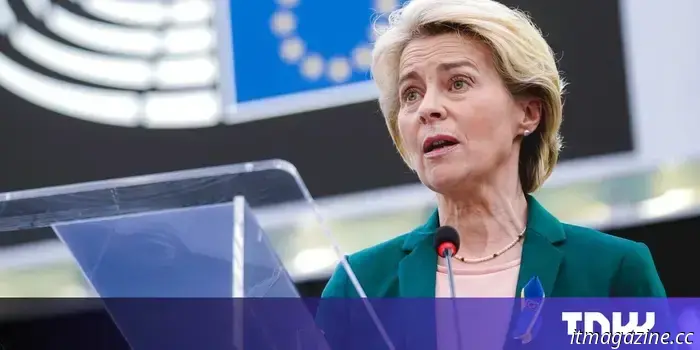
The EU's €2 trillion budget neglects an essential technological aspect: Open source.
On July 16, the European Commission put forth a €2 trillion seven-year budget—the largest in the EU's history—to enhance autonomy, competitiveness, and resilience. The spending proposal focuses on cybersecurity, innovation, and essential digital elements but notably excludes a vital aspect: open source.
Open source software—developed and maintained by communities instead of solely by private companies and available for free editing and modification—forms the backbone of the current digital infrastructure. Since the 1990s, it has been integral to the digital frameworks relied upon by European industries and public sector organizations, leading to significant dependence on open source applications and libraries.
From commercial devices and services to government systems and research initiatives, open source fuels the internet and numerous platforms that we use every day. It provides transparency, security, and flexibility that proprietary software cannot offer. By investing in open source, Europe can bolster small enterprises, academic institutions, and public bodies, equipping them with the means to compete against global technology leaders.
However, despite its significance, the budget proposal lacks targeted funding for open source. This shortcoming is particularly striking given the emphasis open source has received in recent legislation, such as the Cyber Resilience Act, the AI Act, and the proposed Cloud and AI Development Act. The absence of such funding is concerning as Europe strives to enhance digital sovereignty, reinforce cybersecurity, and improve competitiveness.
If Europe intends to maintain its competitiveness and autonomy in the digital landscape, it must strategically and effectively support open source. Public-led investments must mobilize resources that cannot be solely supplied by the private sector, philanthropy, volunteers, and the market.
The case for an EU Sovereign Tech Fund
Grassroots innovation funding has historically formed the basis of the EU's limited open source investments. Consequently, the emphasis has shifted towards scaling these technologies into essential digital infrastructure.
Maintenance funding represents a different approach that has already undergone trial. A recent landmark report from the open technologies think tank OpenForum Europe advocated for a dedicated "EU Sovereign Tech Fund" to back vital European technology initiatives for digital sovereignty, centering on open source. This idea builds on the German Sovereign Tech Fund, which has facilitated global open source collaboration.
A fund like this would be beneficial. Without investment in open source, Europe risks reliance on foreign technologies, susceptibility to external threats, and reduced competitiveness in global markets. Open source allows Europe to create its own technological infrastructure, ensuring greater control, transparency, and security.
This does not represent an isolationist interpretation of digital sovereignty; rather, it's an investment in the autonomy and resilience of global digital infrastructure. It promises long-term advantages for Europe while also supporting alternatives to dominant technological paradigms from the United States—focused on platform monopolies and market-driven control of critical digital infrastructure—and China—where state-directed, centralized models emphasize surveillance and stringent government regulation.
In contrast, Europe’s open source strategy offers a pluralistic and cooperative alternative that prioritizes transparency, interoperability, and public interest, and investing in the global open source ecosystem aligns with these principles.
A missed opportunity in the European Competitiveness Fund
The suggested European Competitiveness Fund—one of the EU's primary financial instruments under its new budget—does not emphasize open source as a vital investment area, neither at a strategic level nor in specific actions related to digitalization. This omission is significant. Since the fund is intended to support innovation and digitalization across Europe, overlooking open source is a glaring but corrigible error.
The lack of funding for open source could be viewed as shortsighted, hindering Europe’s digital transformation amid an increasingly multipolar and competitive geopolitical environment. EU leaders should elevate the importance of open source in their new seven-year budget by explicitly incorporating it as part of the European Competitiveness Fund's focus on digitalization. Establishing an EU Sovereign Tech Fund, alongside additional designated investments in open source, will be crucial for achieving their objectives.
This article is authored by Daniel Stenberg, co-founder and lead developer of cURL, a command-line tool for data transfer, and president of the European Open Source Academy.
Other articles
 Acer Swift Lite laptops have entered the Russian market.
Sales of Acer Swift Lite ultrabooks have begun in Russia. The models are positioned as a solution for users who value portability and balanced performance.
Acer Swift Lite laptops have entered the Russian market.
Sales of Acer Swift Lite ultrabooks have begun in Russia. The models are positioned as a solution for users who value portability and balanced performance.
 How European battery startups can prosper alongside Asian industry leaders.
Joseba Villate, the CEO of the green battery startup alterity, outlines five strategies for European companies to compete with their Asian counterparts.
How European battery startups can prosper alongside Asian industry leaders.
Joseba Villate, the CEO of the green battery startup alterity, outlines five strategies for European companies to compete with their Asian counterparts.
The EU's €2 trillion budget neglects an essential technological aspect: Open source.
Daniel Stenberg, president of the European Open Source Academy and the creator of cURL, is concerned that the upcoming major budget of the EU may overlook open source initiatives.
